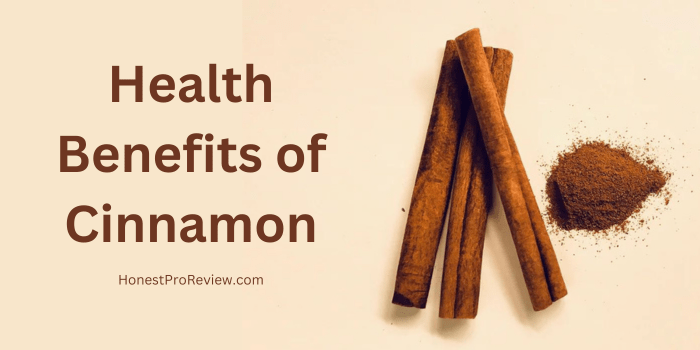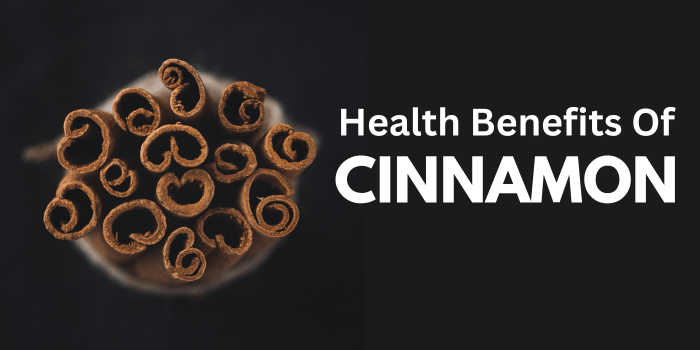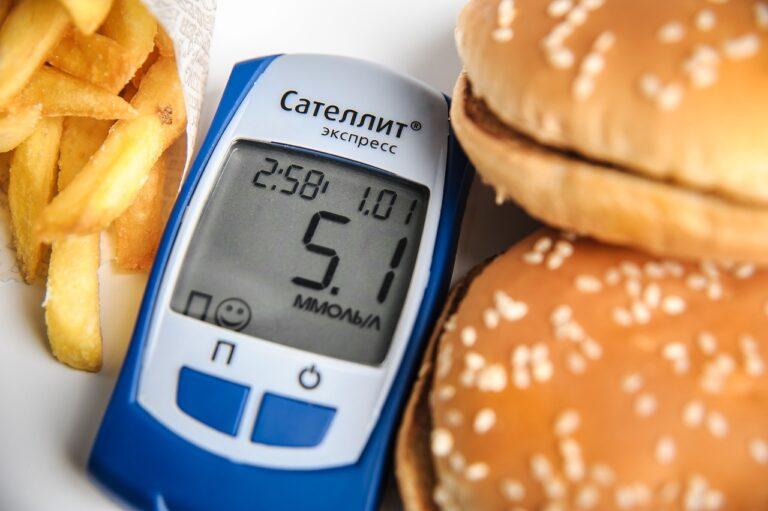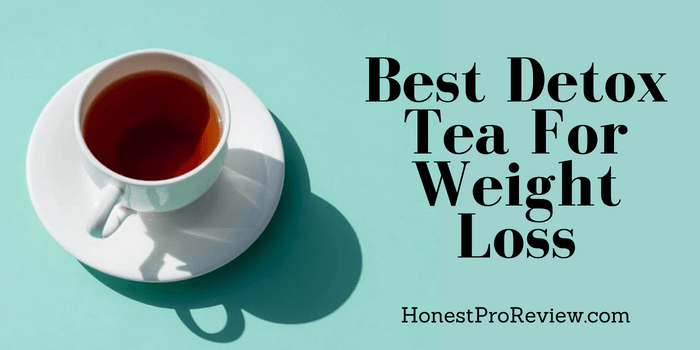What is Cinnamon? Health Benefits and Side Effects Explained!

June 26, 2025 by Robert Dowling
Antioxidants and other healthy substances are found in cinnamon. As per researches, it might reduces inflammation, prevent heart disease, and regulate blood sugar level.
Traditionally, people have valued the therapeutic benefits of the spice cinnamon. Many of the possible health benefits of cinnamon have recently been confirmed by modern science.
What is Cinnamon?
Cinnamon contains minerals, vitamins, and plant-based compounds that may have significant health advantages.
Magnesium, potassium, and calcium are all present in cinnamon. Potassium controls heart rate and helps to offset sodium’s impact on blood pressure. Potassium plays a role in nerve function as well.
Together, calcium and magnesium support a regular heartbeat. Both of these minerals are crucial for bone health because they guard against osteoporosis, a condition where bones become brittle.
Health Benefits of Cinnamon

Regulating Blood Sugar Level
Cinnamon is enriched with lots of anti-inflammatory properties that works in various health conditions. One of the major health benefits of cinnamon is that it helps in regulating blood sugar level. The compounds found in cinnamon reduces insulin resistance and oxidative damage. According to few experts, cinnamon is very beneficial in treating type-2 diabetes.
Antibiotic Properties
Cinnamon is also known for its antibiotic properties that helps in preventing bacterial or viral infections. Baterial infections may be affected in various parts of bodies and compounds found in cinnamon helps in reducing bacterial and fungal infections like treating fungal infection in skin, viral diseases, and much more.
Antioxidants
Our body is protected by antioxidants from getting damaged by the free radicals. Also, polyphenols and other potent antioxidants are abundant in cinnamon. One study stated that taking cinnamon supplements might raise antioxidant levels along with lowering levels of inflammatory indicators. Actually, cinnamon has such potent antioxidant properties that it might be utilized as a natural preservative for food.
Cardiovascular Health
Cardiovascular disease is the biggest cause of deaths globally, and cinnamon is also associated to the lower chances of developing the cardiovascular condition.
One review found that consuming with a minimum of 1 and a 1/2 grams of cinnamon regularly helped individuals with metabolic issue lower their triglyceride, total cholesterol, bad cholesterol, and sugar levels.
Cinnamon may lower triglyceride as well as overall cholesterol levels, that are associated with risk for cardiovascular disease, according to another study.
Reduces Cholesterol level
Cinnamon has been demonstrated to help lower LDL cholesterol levels in the body while leaving the levels of good cholesterol unaffected. Because of this, it’s an excellent all-natural treatment for high cholesterol.
Eliminates Acne
Bacteria that cause acne can be completely eliminated by cinnamon! Simply mix three spoonfuls of honey and a single teaspoon of cinnamon powder to create a paste to create one delicious-smelling acne mask. After letting it sit on your face for ten minutes, wash it off to reveal a renewed complexion..
Improves metabolism
When discussing things to eat in order to lose weight, cinnamon is frequently mentioned. It has the power to speed up the metabolism, that could assist you drop weight more successfully, particularly if yours is slow.
Reduces Inflammation
The miraculous substance that provides cinnamon its flavor and aroma, cinnamonaldehyde, can also reduce edema and keep blood platelets from sticking together. Beyond just being anti-inflammatory, it also has the ability to prevent specific compounds linked to aberrant cell proliferation, which reduces the risk of disease.
Neuro Benefits
Chronic loss of the molecular makeup or functioning of nerve cells is a hallmark of neurodegenerative disorders. The two most prevalent forms are Alzheimer’s and Parkinson’s. The accumulation of tau protein, one of the symptoms of Alzheimer’s disease, appears to be inhibited by several substances contained in cinnamon. In a 2014 experiment, cinnamon protected neurons, restored normal neurotransmitter levels, and enhanced motor function in Parkinson’s disease-affected rats.
Prevents Fungal Infection
One of cinnamon’s primary active ingredients, cinnamonaldehyde, may be effective against a variety of infections. Cinnamon oil may be able to help combat some fungi that trigger respiratory tract infections, according to tests conducted in test tubes.
Additionally, it might stop some bacteria from growing, like Salmonella and Listeria. Additionally, cinnamon’s antibacterial properties may lessen foul breath and avoid tooth decay. However, since the majority of the information comes from experiments in test tubes, further human research is required.
Anti-cancer property
One of the main factors contributing to cinnamon’s effectiveness as a diet for fighting cancer is its capacity to reduce the growth of tumors. The best approach to make sure you’re getting sufficient cinnamon for preventing cancer may be by taking a supplement. It makes it simple to consume and eliminates the necessity to add to your food or consume it as a powder.
Supports Anti-aging
The proteins that make skin smooth and supple, elastin and collagen, are produced less by our skin as we age. Numerous creams and lotions make the claim that they can aid in the production of these kinds of proteins, but the extract of cinnamon could be able to achieve the same results without the need of additional chemicals.
Supports healthy digestion
Your body will be better able to absorb the vitamins and minerals from whatever you eat if you use cinnamon to assist your digestive system become more clear. Additionally, you’ll experience less stomach issues like constipation, diarrhea, and congestion as a result. Cinnamon’s antibacterial and antimicrobial characteristics aid in removing dangerous microorganisms from your intestines, thereby enhancing its functionality.
Promotes hair growth
Despite the lack of conclusive research, some scientists are adamant that cinnamon can promote hair growth. It accomplishes this by promoting the supply of blood to the follicles that produce hair, increasing the circulation necessary for the growth of your hair. Make a homemade hair growth paste by combining 1 tablespoon of cinnamon powder, 1 tbsp of honey, and around one tablespoon of coconut oil.
Possible Side Effects
It’s crucial to monitor the dosage and avoid taking too much of any supplement, as with all others. Cassia cinnamon contains coumarin, which may have negative effects.
Lower Blood Sugar – Among the negative effects of consuming too much cinnamon is the fact that it can cause critically low blood sugar levels.
Damage to the liver – Especially in people with pre-existing liver illness, consuming too much cinnamon may result in liver damage.
Allergies – Some individuals are allergic to cinnamon from birth or later on in life. Every time you consume cinnamon, you may experience stomach discomfort and skin rashes as signs of a cinnamon sensitivity.
Concluding Remark
Cinnamon is a multipurpose spice that has a variety of health advantages. It may aid in reducing inflammation, blood sugar levels, and risk factors for heart disease because of the several beneficial components it contains. For the best outcome, be sure you use Ceylon cinnamon or, if you are using Cassia cinnamon, use it moderately.
Cinnamon is a tasty spice that has been connected to numerous health advantages. While eating in moderation is safe, going overboard can have negative effects. This mostly pertains to regular cinnamon because of the large levels of coumarin it contains, that has been connected to diseases like cancer and liver damage.
Cinnamon is a healthful spice that is safe to take in moderate amounts, while consuming too much of it might cause some negative effects. It is sufficient to eat less than the recommended daily amount to give you the benefits for your health.
Before consuming any supplements, it is always advisable to speak with your doctor, particularly if you are also on other medications. You may sometimes drink cinnamon tea or sprinkle a small quantity of cinnamon on food in order to reap the health advantages of cinnamon without worrying about the dangers of coumarin.






